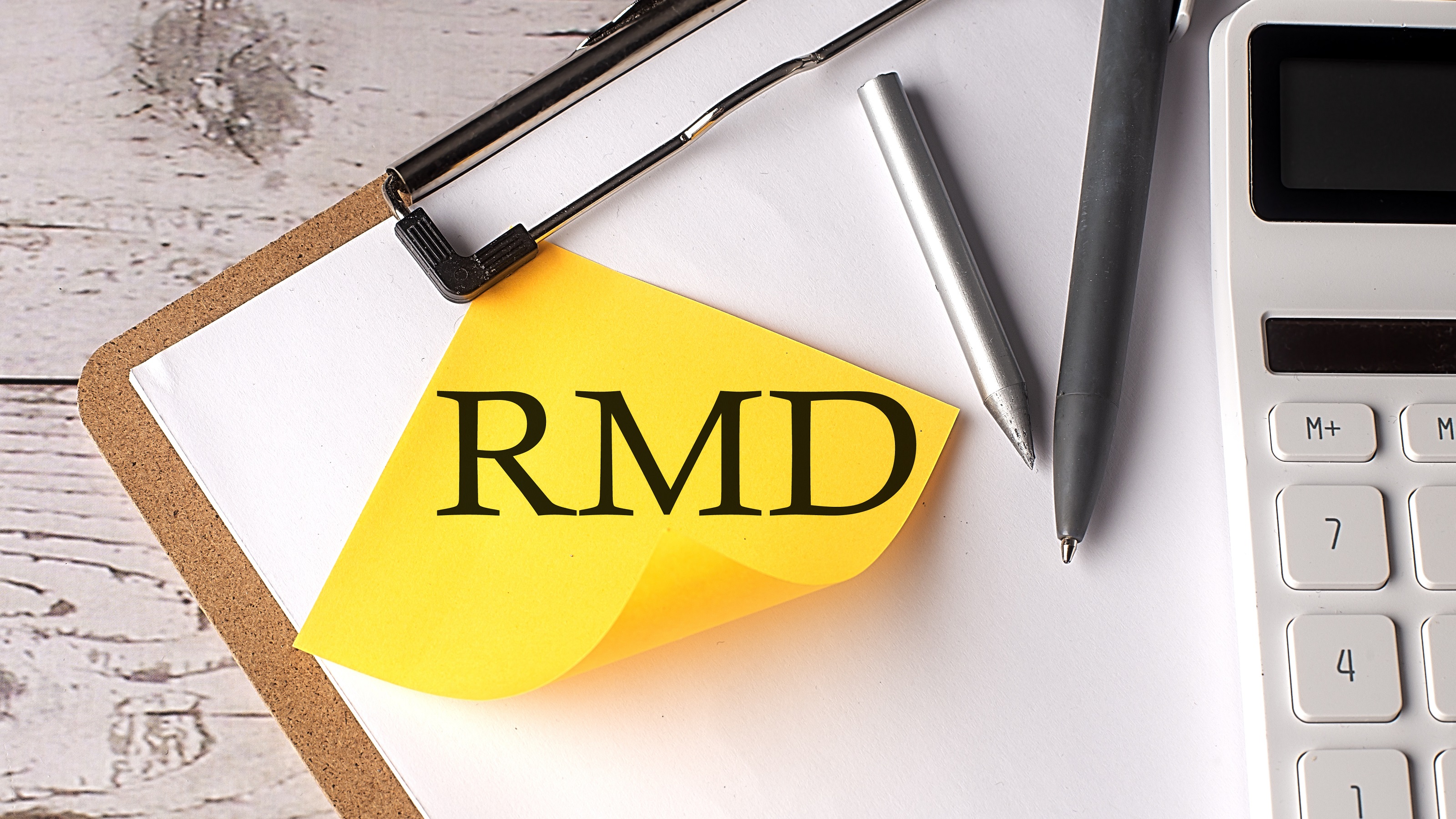How to Optimize Your RMDs in Retirement
No matter where you are in your financial journey, many options are available, including eliminating RMDs altogether through Roth conversions.


Profit and prosper with the best of Kiplinger's advice on investing, taxes, retirement, personal finance and much more. Delivered daily. Enter your email in the box and click Sign Me Up.
You are now subscribed
Your newsletter sign-up was successful
Want to add more newsletters?

Delivered daily
Kiplinger Today
Profit and prosper with the best of Kiplinger's advice on investing, taxes, retirement, personal finance and much more delivered daily. Smart money moves start here.

Sent five days a week
Kiplinger A Step Ahead
Get practical help to make better financial decisions in your everyday life, from spending to savings on top deals.

Delivered daily
Kiplinger Closing Bell
Get today's biggest financial and investing headlines delivered to your inbox every day the U.S. stock market is open.

Sent twice a week
Kiplinger Adviser Intel
Financial pros across the country share best practices and fresh tactics to preserve and grow your wealth.

Delivered weekly
Kiplinger Tax Tips
Trim your federal and state tax bills with practical tax-planning and tax-cutting strategies.

Sent twice a week
Kiplinger Retirement Tips
Your twice-a-week guide to planning and enjoying a financially secure and richly rewarding retirement

Sent bimonthly.
Kiplinger Adviser Angle
Insights for advisers, wealth managers and other financial professionals.

Sent twice a week
Kiplinger Investing Weekly
Your twice-a-week roundup of promising stocks, funds, companies and industries you should consider, ones you should avoid, and why.

Sent weekly for six weeks
Kiplinger Invest for Retirement
Your step-by-step six-part series on how to invest for retirement, from devising a successful strategy to exactly which investments to choose.
Required minimum distributions (RMDs), or the minimum amount you must withdraw from your pre-tax retirement accounts each year, are a key consideration for retirement planning. That said, the rules and ways you can, and should, leverage them have changed.
The old rule was you had to begin RMDs at 70½ years old. The SECURE Act updated the age for RMDs to 72. The SECURE 2.0 Act updated the age to 73. The raise in RMD age lets retirement assets build longer, but there are still many paths you can take with current RMDs and future RMD planning. It all depends on where you are in your financial journey.
Let’s say you are in your 20s or 30s and have a 401(k) at work. You are contributing to a pre-tax vehicle, taking full advantage of the employer match and plan on working there for decades. When you retire, you will have accumulated a large pre-tax retirement nest egg. Would you rather have six figures in a pre-tax retirement account or six figures in a Roth? Most would prefer the latter.
From just $107.88 $24.99 for Kiplinger Personal Finance
Become a smarter, better informed investor. Subscribe from just $107.88 $24.99, plus get up to 4 Special Issues

Sign up for Kiplinger’s Free Newsletters
Profit and prosper with the best of expert advice on investing, taxes, retirement, personal finance and more - straight to your e-mail.
Profit and prosper with the best of expert advice - straight to your e-mail.
A potential way to reduce the RMD requirement later in life is to switch your deferral from pre-tax to Roth now, as Roth IRAs do not have the RMD requirement. While employer matching contributions still need to be invested pre-tax, maxing out your Roth contributions will minimize your RMDs.
You might consider a Roth conversion
As it is uncommon to stick with the same employer for decades, one strategy clients can utilize when switching jobs is a conversion. A Roth conversion is when you take a pre-tax account, such as a traditional IRA, and move all, or a partial amount, to a Roth. This creates a taxable event (federal and sometimes state), which may increase or decrease your tax bill or refund.
For readers who are 73 and older — I work with a client who is self-employed and is adding to her Simplified Employee Pension (SEP) plan IRA while being paid out RMDs. She consistently adds hundreds of dollars each month to her IRA and has her RMD scheduled to pay out at the end of the year. Because of her age and high balance, the RMD is significant, making it difficult for her to build her retirement savings.
That said, it still made financial sense for her to continue to add to her SEP. We just needed to figure out a way to stay invested.
Ultimately, we set up a non-retirement account at the SEP-IRA custodian. Each year, her SEP RMD is automatically calculated and paid to her non-retirement account. She utilizes the same mutual fund in her non-retirement account and SEP account, so when the RMD occurs, it satisfies her RMD requirement and keeps her invested. I utilize this same strategy for people who have an RMD requirement but do not need the RMD to supplement retirement income.
Even if you are RMD age, it is not too late to do Roth conversions. They’re a great way to reduce future RMDs, since Roth IRAs do not have an RMD. The year you do the conversion, you must take your RMD first, and then you can convert any amount to a Roth. While there will be taxes owed on the RMD amount and also on the conversion amount, if we can keep someone in the same tax bracket, that is a win. If the conversion sends some of their income into the next tax bracket, they did too much.
Look at your tax rates
Most people between ages 40 and 70 have already accumulated wealth in a pre-tax 401(k) or traditional IRA. If you only have a 401(k) and are adding to the pre-tax position, I recommend looking closer at your tax rates. You may find it beneficial to reduce the pre-tax 401(k) addition and increase the Roth 401(k) contribution. Maybe there is an old 401(k) from a previous employer or a traditional IRA you could convert, if it doesn’t send you into the next tax bracket. Or you could do partial amounts over time to stay in the same tax bracket.
I work with a married couple — one of them is still working, and the other is retired. For the retired one, we convert the same amount of their former W-2 wages to a Roth. The household income for the year is the same, even though only one spouse works. They remain in the 12% federal tax bracket. This strategy works great if the couple can live off the W-2 wages, or they have extra cash in savings to supplement income.
I worked with a single client who was also in the 12% tax bracket. She strategically retired a few months into the year and wanted to convert most of her traditional IRA in the first year of retirement. Her conversion amount plus her partial year earned income equaled her previous year’s income, so taxes were similar for her. She lived off her savings account and completed another conversion the year after.
The best course of action for all is to team up with a savvy tax preparer and a financial adviser. There are many options, but I would recommend someone you trust and enjoy working with. Feeling educated and informed on the choices around RMDs will help you make the best decisions for you and your finances.
Case studies may not be representative of the results of all clients and are not indicative of future performance or success.
The opinions expressed are those of the author and do not necessarily represent those of the employing firm. Case studies may not be representative of the results of all clients and are not indicative of future performance or success.
*These examples provided are hypothetical situations based on real life examples. Names and circumstances have been changed. The opinions voiced in this material are for general information only and are not intended to provide specific advice or recommendations for any individual. To determine which investments or strategies may be appropriate for you, consult your financial advisor prior to investing. This information is not intended to be a substitute for specific individualized tax advice. We suggest that you discuss your specific tax issues with a qualified tax advisor.
Traditional IRA account owners have considerations to make before performing a Roth IRA conversion. These primarily include income tax consequences on the converted amount in the year of conversion, withdrawal limitations from a Roth IRA, and income limitations for future contributions to a Roth IRA. A Roth IRA offers tax deferral on any earnings in the account. Qualified withdrawals of earnings from the account are tax-free. Withdrawals of earnings prior to age 59½ or prior to the account being opened for 5 years, whichever is later, may result in a 10% IRS penalty tax. Limitations and restrictions may apply. CBSI-6487050.1-0324-0426
Related Content
- Required Minimum Distributions (RMDs): Key Points to Know
- Stressing About RMDs? Two Ways to Reduce or Even Eliminate Them
- New RMD Rules: Starting Age, Penalties, Roth 401(k)s, and More
- Three Ways You Can Cut the Tax Stress of RMDs
- How to Ride the Waves of Interest Rates and Inflation
Profit and prosper with the best of Kiplinger's advice on investing, taxes, retirement, personal finance and much more. Delivered daily. Enter your email in the box and click Sign Me Up.

Isaac Morris is a registered LPL Financial Advisor with TruStage Wealth Management Solutions. Isaac works at Summit Financial Advisors located at Summit Credit Union where he helps individuals and families pursue their financial goals by providing financial advice based on 10-plus years of experience in the industry. He is deeply committed to his clients’ financial well-being and strives to listen intently to their needs and concerns to provide them with just the right help for their unique circumstance.
-
 Ask the Tax Editor: Federal Income Tax Deductions
Ask the Tax Editor: Federal Income Tax DeductionsAsk the Editor In this week's Ask the Editor Q&A, Joy Taylor answers questions on federal income tax deductions
-
 States With No-Fault Car Insurance Laws (and How No-Fault Car Insurance Works)
States With No-Fault Car Insurance Laws (and How No-Fault Car Insurance Works)A breakdown of the confusing rules around no-fault car insurance in every state where it exists.
-
 7 Frugal Habits to Keep Even When You're Rich
7 Frugal Habits to Keep Even When You're RichSome frugal habits are worth it, no matter what tax bracket you're in.
-
 For the 2% Club, the Guardrails Approach and the 4% Rule Do Not Work: Here's What Works Instead
For the 2% Club, the Guardrails Approach and the 4% Rule Do Not Work: Here's What Works InsteadFor retirees with a pension, traditional withdrawal rules could be too restrictive. You need a tailored income plan that is much more flexible and realistic.
-
 Retiring Next Year? Now Is the Time to Start Designing What Your Retirement Will Look Like
Retiring Next Year? Now Is the Time to Start Designing What Your Retirement Will Look LikeThis is when you should be shifting your focus from growing your portfolio to designing an income and tax strategy that aligns your resources with your purpose.
-
 I'm a Financial Planner: This Layered Approach for Your Retirement Money Can Help Lower Your Stress
I'm a Financial Planner: This Layered Approach for Your Retirement Money Can Help Lower Your StressTo be confident about retirement, consider building a safety net by dividing assets into distinct layers and establishing a regular review process. Here's how.
-
 The 4 Estate Planning Documents Every High-Net-Worth Family Needs (Not Just a Will)
The 4 Estate Planning Documents Every High-Net-Worth Family Needs (Not Just a Will)The key to successful estate planning for HNW families isn't just drafting these four documents, but ensuring they're current and immediately accessible.
-
 Love and Legacy: What Couples Rarely Talk About (But Should)
Love and Legacy: What Couples Rarely Talk About (But Should)Couples who talk openly about finances, including estate planning, are more likely to head into retirement joyfully. How can you get the conversation going?
-
 How to Get the Fair Value for Your Shares When You Are in the Minority Vote on a Sale of Substantially All Corporate Assets
How to Get the Fair Value for Your Shares When You Are in the Minority Vote on a Sale of Substantially All Corporate AssetsWhen a sale of substantially all corporate assets is approved by majority vote, shareholders on the losing side of the vote should understand their rights.
-
 How to Add a Pet Trust to Your Estate Plan: Don't Leave Your Best Friend to Chance
How to Add a Pet Trust to Your Estate Plan: Don't Leave Your Best Friend to ChanceAdding a pet trust to your estate plan can ensure your pets are properly looked after when you're no longer able to care for them. This is how to go about it.
-
 Want to Avoid Leaving Chaos in Your Wake? Don't Leave Behind an Outdated Estate Plan
Want to Avoid Leaving Chaos in Your Wake? Don't Leave Behind an Outdated Estate PlanAn outdated or incomplete estate plan could cause confusion for those handling your affairs at a difficult time. This guide highlights what to update and when.